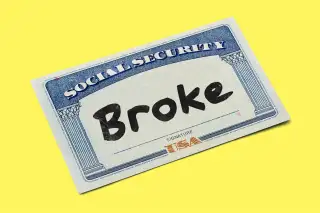Will Social Security Really Run Out of Money?

As long as people continue to work and pay taxes, Social Security will not run out of money, says Alicia H. Munnell, director of the Center for Retirement Research at Boston College.
The numbers fluctuate depending on tax revenue and Social Security benefits, but the system brings in enough money each year to cover roughly three-quarters of the benefits it pays out. “The Social Security system is the simplest system in the world,” says Munnell, who was previously on the President’s Council of Economic Advisers and served as assistant secretary of the Treasury for economic policy. “Money comes in and money goes out.”
So what’s all the talk of insolvency? That refers to the Social Security Trust, which is a surplus that was built up when taxes collected exceeded benefits paid out. The trust makes up the difference between money coming in via Federal Insurance Contributions Act (FICA) taxes and money paid out. “Once that is gone, the system will only be able to pay the 75% covered by the payroll tax,” she says. “The system is not going to zero. It is going to 75%.”
Based on the Social Security Administration’s 2015 report, the trust is on track to be depleted in 2034, at which point the system will be able to pay 79% of benefits from ongoing tax revenue. That projection is expected to shrink to 73% by 2089. The Congressional Budget Office estimates that the shortfall could come as early as 2025.
That's assuming no changes are made to the retirement age, Social Security payments, or FICA taxes. While it is a hot-button topic for politicians, getting Social Security to pencil out isn’t the gargantuan task many make it out to be, Munnell says.
It’s a matter of making small changes to retirement ages and benefits, or increasing the payroll tax that funds Social Security. “If we increased the employer share [of FICA] by 1.34% and employee share by 1.34%, that would be enough to pay the current benefits for everyone who reaches retirement through 2089,” she says.
For those who cringe at the idea a tax increase, think back to 2013. Following the financial crisis there was a temporary 2% reduction of employees’ share of payroll tax, first via the Making Work Pay credit and then with a 2011 payroll tax holiday. When the vacation ended in 2013, paychecks effectively shrunk by 2% and, Munnell says, “nobody seemed to notice.”